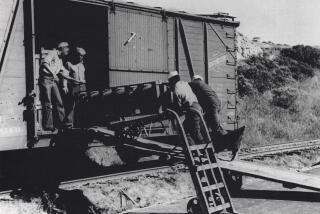In Settlement, U.S. ‘Regrets’ WWII Thefts by Army
MIAMI — Alex Moskovic, who survived Nazi Hungary as a boy, had been seeking some sort of justice, some type of proof that wrongs had been committed when Jewish belongings disappeared.
It came Tuesday when the Justice Department issued a statement that the government “regrets the improper conduct of certain of its military personnel” who plundered Jewish goods from a Nazi train at the end of World War II.
The statement was part of a $25.5-million settlement between the U.S. government and Hungarian Holocaust survivors approved by a Miami federal judge Sept. 26.
“I think we have closure,” said Moskovic, 74, of Hobe Sound, Fla. “We wanted an acknowledgment. I’m glad it’s over, to tell you the truth.”
Moskovic will serve on a survivors advisory committee in Florida to make sure agencies in Broward and Palm Beach counties distribute the money properly. He said although the government letter didn’t use the word “apology,” it used the word “regret,” which is fine with him.
In 1944, the Nazis loaded $200 million in gold and jewelry, including thousands of wedding rings, Oriental rugs, fabrics and artwork on dozens of rail cars bound for Germany from Budapest.
The so-called Gold Train was abandoned by the Nazis in Austria and recovered by the U.S. Army on May 16, 1945. A report by a presidential advisory commission in 1999 said most of the treasures had vanished.
The 62,000 Hungarian Holocaust survivors worldwide will not get money directly.
The funds will go through Jewish social service agencies over the next five years to help needy Hungarian survivors with emergency relief that includes home and dental care, rent and electricity subsidies, food and medical help, including eyeglasses.
“One must view the government’s acceptance of responsibility for the thefts as very important, and we hope it will stand as a durable lesson for the future,” said Sam Dubbin, one of the lawyers for Hungarian families in South Florida who brought the original lawsuit in 2001.
Jack Rubin, 77, of Boynton Beach, Fla., was one of the plaintiffs. He said he was pleased with Tuesday’s letter.
“I’m delighted,” Rubin said. “I am so happy; you have no idea. Only in a country like ours you can find justice.”
Tuesday’s government statement reads: “Although the conduct of its personnel was appropriate in most respects, it was contrary to U.S. policy and the standards expected of its soldiers in two important areas.”
First, some military personnel failed to return Gold Train property that had been requisitioned by the military, such as typewriters, rugs, cutlery and linens that were used by U.S. military personnel in offices and official residences in postwar Europe, the statement said.
Also, Gold Train property was stored in a warehouse and “some of the thefts were perpetrated by members of the United States armed forces.”
World Jewish Congress President Edgar M. Bronfman said in a letter Tuesday to U.S. Atty. Gen. Alberto R. Gonzales that he had concluded the Gold Train thefts were “an isolated blemish” caused by a few U.S. soldiers that did not detract overall from “the tremendous role of the United States” in liberating Europe from Nazi oppression.
“This settlement is, I believe, in all the circumstances a fair and just one,” Bronfman said. “It is both an acknowledgment of the history of what took place as well as an effective means of assisting” Hungarian Holocaust survivors.
More to Read
Sign up for Essential California
The most important California stories and recommendations in your inbox every morning.
You may occasionally receive promotional content from the Los Angeles Times.










